NAD is a vital molecule that’s not just found in a few cells but every cell within our bodies.
It’s a part of us, contributing to our metabolic regulation, energy production, DNA repair, and many other crucial physiological processes.
However, as we age, our NAD levels naturally decline.1 Leading researchers believe this is one of the primary driving forces behind aging.
Intriguingly, nascent studies suggest that promoting the upregulation of NAD by using NAD precursors could potentially help inhibit that decline and may even produce anti-aging benefits in many organisms.2
NMN is a direct precursor to NAD. When ingested orally, it should be quickly and efficiently absorbed into our cells and converted into NAD.3
NAD and NMN have shown exciting prospective possibilities for longevity and healthspan support. So, why haven’t more people added these possibly game-changing molecules to their daily routines?
We’ll attempt to get to the heart of the matter by going over:
- What is NAD?
- What is NMN?
- Why Supplement with NMN and Not NAD?
- What’s the Research Behind NAD?
- Who Should Take NAD Supplements?
- The Downside of NAD Supplements
- What Results Might Come From Using NAD Precursor Supplements?
- A Look At NMN Supplements – The Actual NAD Supplement
We’ll also help you understand how you may be able to utilize NAD and NMN to strengthen your aging outcomes so that you live with vitality for many years to come.
But first, let’s discuss the key differences between NAD and NMN.
What is NAD?
NAD (Nicotinamide Adenine Dinucleotide) is a coenzyme abundant throughout nature, existing within the cells of virtually all living things.
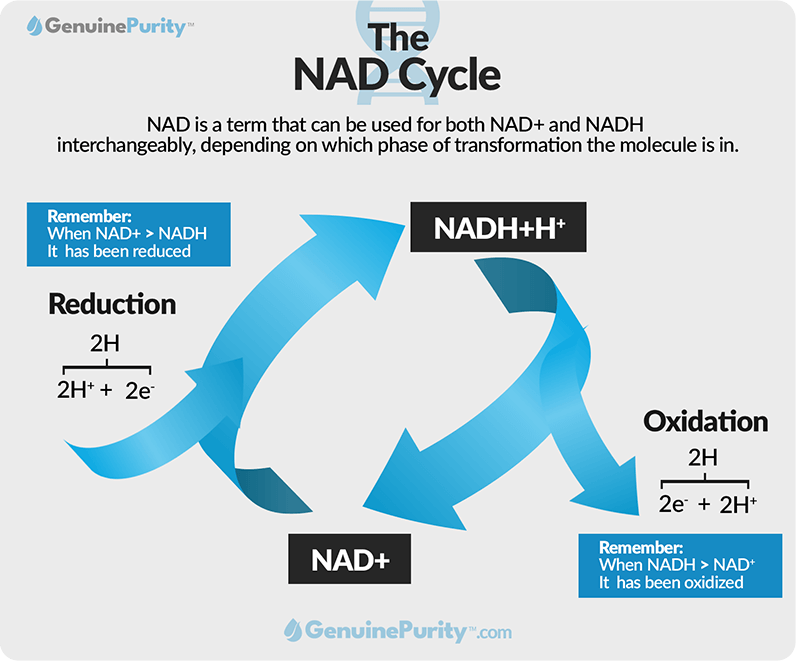
Are NAD+ and NADH the Same?
The short answer is no. The longer answer is slightly more complex – especially when it comes to health supplements. Although active ingredients may include either NAD+ or NADH, it’s important to differentiate them to determine a supplement’s efficacy.
There are two forms of NAD (Nicotinamide Adenine Dinucleotide): NAD+ and NADH. NAD (without the plus sign) is often used by supplement brands to describe both molecular forms. However, there are key differences worth understanding before hitting that “buy now” button.
It is a cofactor in hundreds of biochemical processes, affecting everything from cellular signaling and genomic stability to the conversion of nutrients into energy and defense against oxidative stress. Without healthy NAD stores, our healthspan rapidly falls by the wayside. Too low of an NAD deficiency can negatively impact:

Simply put, NAD is likely essential for life and its longevity.4
NAD exists in two structurally different forms—NAD+ and NADH.
NAD+ is the oxidized and positive form of NAD. It accepts electrons during biochemical reactions. NADH is the reduced and neutral form of NAD. It donates electrons during biochemical reactions.
Through redox reactions, our cells transform NAD+ into NADH and vice versa based on physiological needs.
The term “NAD” is commonly used to refer to both NAD+ and NADH.
NAD+ and NADH are both a part of the NAD process. And while they’re two similar yet unique molecular structures, they each have a vital role in our energy-making processes.
NAD+ is a positively charged molecule (hence the plus sign) that acts as a raw carrier or shell that delivers “goods” in the form of mitochondrial enzymes to cells for optimal function.
A transformation happens when the NAD+ molecule “picks up” Hydrogen (H+) along with two electrons. As the positively-charged NAD+ molecule is combined with the positively-charged Hydrogen and two negatively-charged electrons, the molecule is neutralized and thus becomes NADH (without the plus sign).
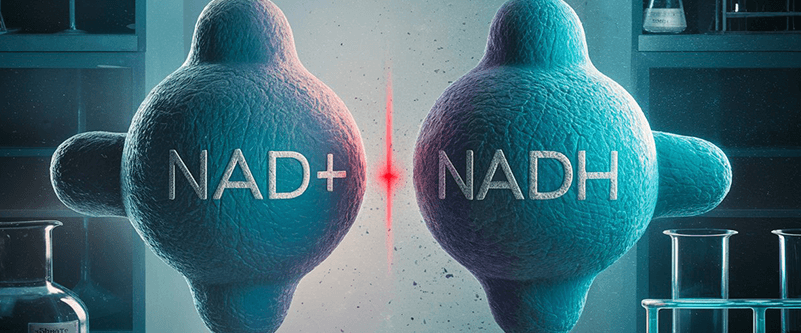
So, NAD+ can essentially transform itself into NADH, but this transformation can also happen in reverse. Still with us?
As NADH “drops off” its load and is delivered to cells for energy conversion, it then becomes that empty carrier known as NAD+ once again. NAD+ is then free to go off and collect another batch of Hydrogen and electrons that will, in turn, become NADH – a seemingly never-ending part of the mitochondrial process.
NAD is a loose term that can be used for both NAD+ and NADH interchangeably, depending on which phase of transformation the molecule is in.
What Exactly is the Difference Between NAD and NMN?
NAD is a coenzyme that offers a wide range of benefits. But what makes NAD is just as important. NMN (nicotinamide mononucleotide) is a direct precursor to NAD+ and supports the production of this life-giving enzyme.
Should You Take NAD+ or NADH?
That’s a somewhat difficult question with a complex answer that researchers are still trying to figure out. For the mitochondrial energy-making process to be effective, you need both NAD+ and NADH to balance each other. However, ratio is key to maintain optimal energy distribution to cells.
Although NAD+ and NADH both play an integral role in the mitochondrial process, there is evidence to suggest that a higher ratio of NAD+ to NADH is favorable. However, the exact ratio is still unknown.
What we do know is that NAD+ is required for fundamental biological processes to occur. We also know the body has a limited supply, and NAD+ levels naturally decline with age. There is also evidence to suggest that our NADH levels actually increase with age.4
Lower NAD+ to NADH levels have been strongly implicated with age-related disorders, including diabetes, obesity, neurodegeneration, and cancer.5 In theory, increasing your NAD+ levels through supplementation should equate to a more balanced NAD+/NADH ratio for optimal cell function.
As scientists continue to study the NAD molecule and its varying transformative roles in our biological processes, ideal ratios of NAD+ to NADH can better be established.
Your body needs both NMN and NAD to thrive. But without NMN, there is no NAD+. While NMN may not be as important in our youth, it becomes all too important as we get older and our NAD stores naturally start to decline.
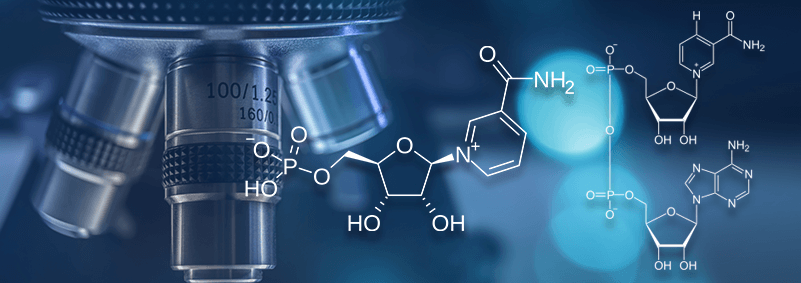
Think of NMN as a behind-the-scenes facilitator. As a natural NAD+ precursor, NMN helps regulate and maintain all the same processes that NAD+ does.
NMN has its own benefits, too. Aside from simply triggering the body to produce more NAD+, NMN has a positive impact on our insulin production and glucose tolerance – allowing our bodies to convert food into energy more easily.
Why Supplement with NMN and Not NAD?

Scientific data indicates that NAD is associated with numerous health benefits across species.
However, its viability as a standalone health supplement presents some challenges.
You see, NAD is a relatively unstable and large molecule. Not only is it susceptible to being broken down by stomach acids, but its size (and poor bioavailability) makes it difficult for our cells to absorb it intact.
NAD precursors, like NMN, on the other hand, are relatively stable and smaller. This helps NMN to be more bioavailable and more easily absorbed by our cells, where it’s converted into NAD.5
That’s why NMN supplementation is usually considered superior to NAD supplementation.
What is the Research Behind NAD?
While extensive human studies are still in the early phases, many researchers report that NAD modulation could be the future of anti-aging science.6
Research suggests abundant NAD levels may positively impact numerous hallmarks of aging, including:
- Genomic Instability – NAD may be crucial for the enzymatic reactions that repair damaged DNA and maintain our genomic stability.
- Cellular Senescence – NAD appears to play a role in preventing cellular senescence, the aged state in which our cells lose the ability to divide properly.
- Telomere Shortening – NAD may help prevent telomeres, the protective caps on the ends of our chromosomes, from shortening. Telomere length is a well-established biomarker of age.
- Stem Cell Exhaustion – NAD could help promote stem cell functionality, which is vital to cellular regeneration and the preservation of our organs.
- Organelle Dysfunction – NAD may help remove damaged organelles and promote the biogenesis of healthy new organelles within our cells.
- Cellular Communication Problems – NAD could impact cellular communication mechanisms by altering the modulation of sirtuins, enzymes essential to regulating cellular signaling.
- Metabolic Decline – NAD may be necessary to support nutrient sensing, which allows cells to identify and adapt energy usage based on nutrient availability.
Restoring NAD levels could inhibit the onset of these age-related issues and may even have the potential to reverse, or at least slow, several components of aging.7
What Areas are Being Clinically Studied for NAD?
The future of NAD and NAD precursor supplements is in the hands of research that’s currently underway. However, many people are getting in on the ground floor of this exciting life-giving molecule by taking a proactive approach to their health and well-being.8
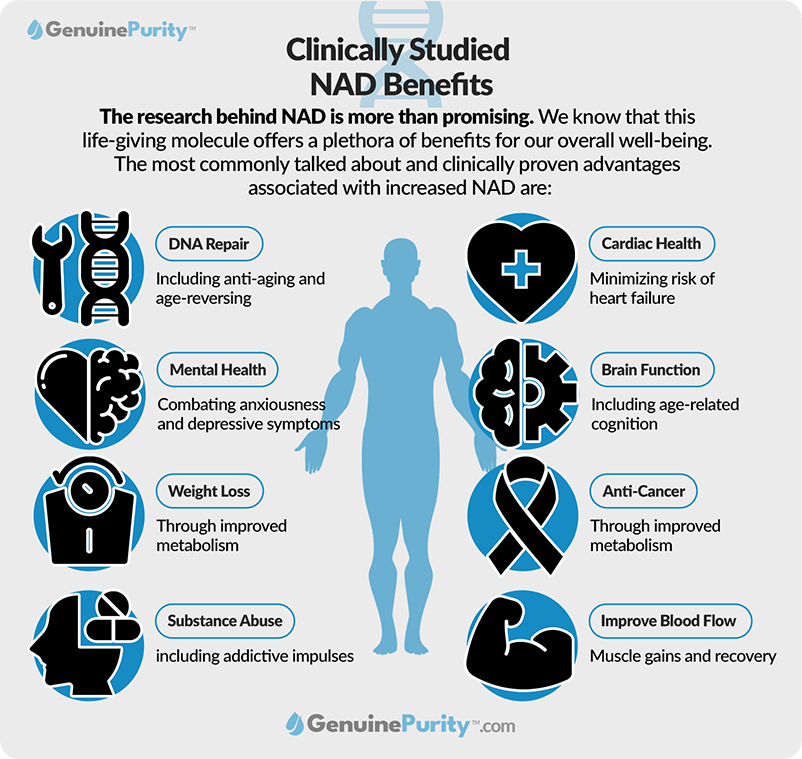
NAD has been shown to aid in healthy aging, including a longer healthspan and overall longevity. However, the majority of current scientific evidence is based on either in vitro (lab) or animal studies. Pending human trials and studies should help clarify the efficacy of NAD supplementation for a wide range of applications.
Who Should Take NAD Supplements?
NAD levels steadily decline with age—The average middle-aged adult may have half the NAD they had in their youth.
Fortunately, NAD supplements (or NAD precursor supplements) help bridge the gap by naturally promoting elevated cellular NAD.
People who typically use NAD supplements and NAD precursors include:
- Adults Over 35 Who Want to Achieve Optimal Health – If you’re over 35 and want to live your healthiest life, NAD supplementation could help.
- Adults Over 65 Who Are Concerned About Aging – If you’d like to ward off age-induced decline and perhaps even reverse some detrimental elements of aging, NAD supplementation could help.
- Holistic Health & Wellness Advocates – If you’re up to date with modern health trends and prefer to use cutting-edge, naturally based wellness-enhancing systems, NAD should be up your alley.
- Fitness-Minded Folks & Athletes – If you’re working hard in the gym or on the field but lack the consistent energy and results you desire, NAD supplementation could help you get over the hump.
- People with Specific Health Concerns – If you’re looking to take a natural approach to addressing specific health concerns, NAD supplementation might help.
Regardless of your situation, it’s best to consult a medical professional before committing to regular NAD supplement use.
What is the Downside of NAD?
NAD supplementation is limited by poor absorbability and bioavailability.
As mentioned, NAD is too large for our cells to absorb fully. Plus, it’s unstable in the human digestive tract, leading to much of its contents being dissolved and expelled.
Conversely, NAD precursors use smaller and more stable molecules like NMN, which helps facilitate natural enzymatic reactions that produce NAD within cells.
Consequently, NAD precursors could efficiently increase NAD levels within numerous tissues.9
NAD precursor supplements, such as NMN, could promote:
- Elevated NAD Production
- Enhanced NAD+ Bioavailability
- Preserved NAD Parameters
Regularly ingesting an NAD precursor should help raise your NAD levels and support optimal aging more effectively than an NAD supplement could.
The Downside of NAD Supplements & Dosages
Researchers understand that NAD has a key role in every living cell in our bodies. However, optimal levels for NAD supplements are still being determined. Scientists know, based on both animal and human studies, that too low of NAD can result in cellular degradation. However, there needs to be a “sweet spot” for any pro-longevity formulation.
Unfortunately, there are a number of factors that need to be taken into consideration to identify optimal supplement dosages, including age, weight, gender, and preexisting conditions.
That leaves researchers with a plethora of unanswered questions, including:
What is considered too high for NAD levels within the body? And, what’s the optimal dosage of NAD supplements?
One clinical review noted:10
“…supplementation of 200 mg nicotinamide, a form of vitamin B3, increased blood NAD+ levels.”
Another short, 8-week trial reported:11
“900mg [of NMN] appears to be safe and well-tolerated among healthy adults.”
While more research needs to be done on long-term use of NAD and NAD precursor supplements, there is a general guideline based on age:
- Those 35 and under can start with 250mg
- Individuals 35-60 can start with 500mg
- Adults 65+ may want to start with 750mg
Be aware that a supplement’s dosage isn’t as transparent as it may appear. A supplement that offers 1000mg of NAD at a 5% purity is less effective than a 200mg supplement that offers a 99% purity. Always check the ingredient list and note a product’s purity before buying.
The Downside of NAD Supplements & Cost
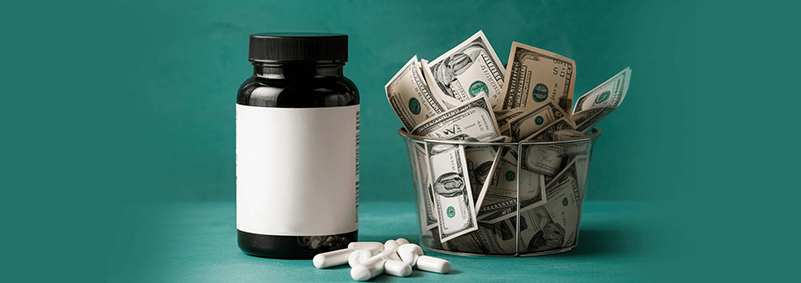
The problem with certain NAD supplements (including NAD precursor supplements like NMN and NR) boils down to cost. Supplement manufacturers have a baseline of what their customers are “willing to spend.” And because NAD, NMN, and NR are expensive to manufacture, brands will sometimes opt to “enhance” their formulas with unnecessary filler ingredients.
If you’re on the hunt for a quality longevity supplement, here are a few things to look for:
- High purity of key active ingredients (90%+)
- NAD precursors (NMN/NR) rather than NAD itself
- Minimal “filler” ingredients
In general, you can expect to pay a higher price tag for a longevity supplement that can produce real results. Quality ingredients cost more to acquire and manufacture. Unfortunately, that trickles down to the end user – you. But that extra few dollars a day can be well worth the investment in your current and future well-being.
What Results Can You Expect from NAD
Precursor Supplements?
It’s important to note that NAD precursor supplements may promote different results for different people.
Numerous factors could alter the results we experience.
These include:
- Age
- Sex
- Weight
- Lifestyle
- Health Status
- Medications
And while we’d like NAD precursors to restore robust NAD levels in our cells instantly, they simply don’t work that way.
These health supplements operate to fuel the enzymatic reactions that help restore NAD levels gradually.
So, while some individuals could notice NAD-related benefits within a few weeks, for others, it may take a few months or, in some cases, more.
That said, using an NAD precursor supplement could promote:
- Anti-Aging Results
- Reversal Of Age-Related Decline
- Improved Cardiovascular Health
- Boosted Metabolic Wellness
- Maintained Cognitive Capacity
Oral supplementation with NAD precursors has generally been well-received.
A study published in 2023 stated, “NMN supplementation increases blood NAD concentrations and is safe and well tolerated with oral dosing up to 900 mg NMN daily”.12
Human studies are still in the initial phases, and there will undoubtedly be more research to come. However, at this point, evidence suggests that orally supplementing with NAD precursors should have no adverse side effects.
Does NAD Have Side Effects?
Supplementation with NAD (including NAD precursors) is generally well-received. With that being said, there is limited research on the potential long-term side effects of NAD when it comes to oral supplementation.
Oral dosages of NAD precursors, like NMN supplements, have been shown to be safe and effective in amounts of 900mg in short-term trials. One 60-day study, for example, noted:
“No safety issues, based on monitoring adverse events (AEs), laboratory and clinical measures, were found, and NMN supplementation was well tolerated.”
No major side effects have been reported with oral supplementation of NAD or NAD precursors. The most noteworthy side effects worth mentioning are associated with direct intravenous (IV) therapy. Those can include;
- Nausea
- Fatigue
- Brain fog
- Headaches
- Diarrhea
- Cramping during therapy
It’s always advisable to consult a physician or medical professional if you have any adverse reactions to supplementation of any kind, whether oral or intravenous.
What Happens if You Stop Taking NMN Supplements?

For younger adults, the body still naturally produces semi-adequate levels of NMN. Therefore, stopping supplementation shouldn’t have any direct negative effects. However, NAD levels will start to decline as you get older.
For middle-aged adults 35+, stopping supplementation can gradually negate the potential benefits associated with higher NAD stores. Older adults who are 65+ have a naturally lower amount of NAD in their bodies (about 80% less), making it difficult to maintain optimal well-being once supplementation is stopped.
Regardless of what age you stop taking NMN supplements, the most serious downside is the continuation of the natural aging process. Without NMN supplements to bolster your NAD levels, you’ll likely be more susceptible to age-related concerns.
A Look At NMN Supplements – The Actual NAD Supplement
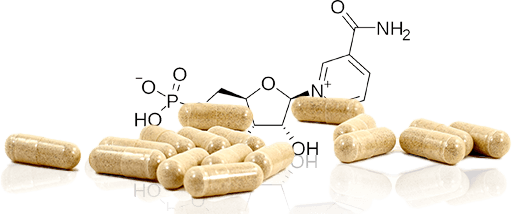
Taking a daily NMN supplement may provide anti-aging benefits.13
Many researchers and longevity experts agree that NMN supplements (and potentially other NAD precursors) could be the actual NAD supplements.
That is to say that, rather than ingesting NAD directly, it’s likely better to ingest a scientifically substantiated NAD precursor like NMN, which should facilitate the elevated NAD production within your cells.
NMN supplementation may help bring about improvements in your:
- Daily Energy
- Cellular Repair
- DNA Protection
- Weight Management
- Immune System Efficiency
- Neuronal Wellness
- Blood Flow
- Healthspan
- Longevity
NAD could be a critical molecule to the future of anti-aging science. Current research shows that supplementing with NMN could be a viable means of raising cellular NAD levels.
If you’re interested in using an NMN supplement, we’d recommend taking a look at GenuinePurity™ Liposomal NMN.
Footnotes
- https://www.ncbi.nlm.nih.gov/pmc/articles/PMC7442590/#:~:text=Two%20MRI%2Dbased%20studies%20have,Go%20to:
↩︎ - https://pubmed.ncbi.nlm.nih.gov/29883761/
↩︎ - https://www.ncbi.nlm.nih.gov/pmc/articles/PMC7238909/
↩︎ - https://pubmed.ncbi.nlm.nih.gov/27304496/
↩︎ - https://www.ncbi.nlm.nih.gov/pmc/articles/PMC9036060/
↩︎ - https://www.ncbi.nlm.nih.gov/pmc/articles/PMC9512238/
↩︎ - https://www.sciencedirect.com/science/article/pii/S2468501118300063
↩︎ - https://www.ncbi.nlm.nih.gov/pmc/articles/PMC5088772/
↩︎ - https://www.sciencedirect.com/science/article/pii/S0006291X24001256
↩︎ - https://www.researchgate.net/publication/354707463_A_single_oral_supplementation_of_nicotinamide_within_the_daily_tolerable_upper_level_increases_blood_NAD_levels_in_healthy_subjects
↩︎ - https://www.ncbi.nlm.nih.gov/pmc/articles/PMC11205942/
↩︎ - https://pubmed.ncbi.nlm.nih.gov/36482258/
↩︎ - https://pubmed.ncbi.nlm.nih.gov/29744033/
↩︎

